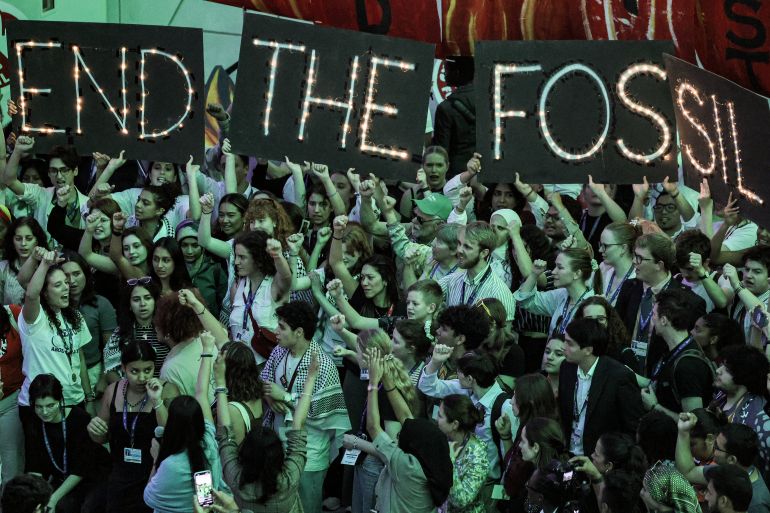Historic COP28 deal agrees to ‘transition away’ from fossil fuels
Delegates at the UN conference agree to ‘historic package’ of climate measures, although ‘phase out’ phrase omitted.

Delegates at the United Nations COP28 climate talks in Dubai have agreed to a deal that would, for the first time, push nations to transition away from fossil fuels to avert the worst effects of climate change.
COP28 President Sultan al-Jaber hailed the deal, approved by almost 200 countries on Wednesday, as an “historic package” of measures that offers a “robust plan” to keep the target of capping global temperatures at 1.5C above pre-industrial levels, within reach.
Keep reading
list of 4 itemsCOP28 climate talks into overtime amid standoff over fossil fuels
‘Elephant in the room’: What is the US military’s carbon footprint?
Communities on US LNG front line ask Biden to reject export terminal
“We have language on fossil fuel in our final agreement for the first time ever,” said al-Jaber, CEO of the United Arab Emirates (UAE) oil company Adnoc.
Officials from around the globe suggested the deal is an important step towards ending the use of fossil fuels.
US climate envoy John Kerry said that both the United States and China intend to update their long-term climate strategies, hailing the agreement as one which “sends very strong messages to the world”.
However, the deal doesn’t go so far as to seek a “phase-out” of fossil fuels, for which more than 100 nations had pleaded. Rather, it calls for “transitioning away from fossil fuels in energy systems, in a just, orderly and equitable manner, accelerating action in this critical decade”.
That transition would be in a way that gets the world to net zero greenhouse gas emissions in 2050 and follows the dictates of climate science.
Earlier on Wednesday, the latest draft of the document calling on the world to wean itself off planet-warming fossil fuels was discussed by delegates after an outcry over a previous proposal forced the summit, which was meant to end on Tuesday, to be extended.
The previous draft offered a list of options that “could” be taken to combat the dangerous heating of the planet, while the final version explicitly “calls on” all nations to contribute through a series of actions.
After the deal was approved on Wednesday, French Minister for Energy Agnes Pannier-Runacher called it “a victory for multilateralism and climate diplomacy”. “Now we need to put in place a plan to exit fossil fuels and we will be attentive to this,” she added.
Earlier, Norway’s climate and environment minister Espen Barth Eide said, “It is the first time that the world unites around such a clear text on the need to transition away from fossil fuels … It has been the elephant in the room – at last, we address it head-on. This is the outcome of extremely many conversations and intense diplomacy.”
Intensive negotiations continued well into the small hours of Wednesday morning after the conference presidency’s initial document angered many countries by avoiding decisive calls for action on fossil fuels, the major driver of global heating.
The UAE-led presidency presented delegates with a new central document – called the global stocktake – just after sunrise.
It was the third version of the document presented in about two weeks of talks. The word “oil” does not appear anywhere in the 21-page document, but it mentions “fossil fuels” twice.
The conference in the UAE, one of the world’s 10 biggest oil producers, has faced criticism for close ties with fossil fuel interests from the start, especially after oil executive al-Jaber was appointed to preside over the negotiations.
Many financial issues are supposed to be hammered out over the next two years at upcoming climate conferences in Azerbaijan and Brazil.
The United Nations Environment Programme estimates that developing nations need $194-366bn per year to help adapt to a warmer and wilder world.
“Overall, I think this is a stronger text than the prior versions we have seen,” said the UN Foundation’s senior adaptation adviser, Cristina Rumbaitis del Rio, prior to the proposal being approved on Wednesday. “But it falls short in mobilising the financing needed to meet those targets.”